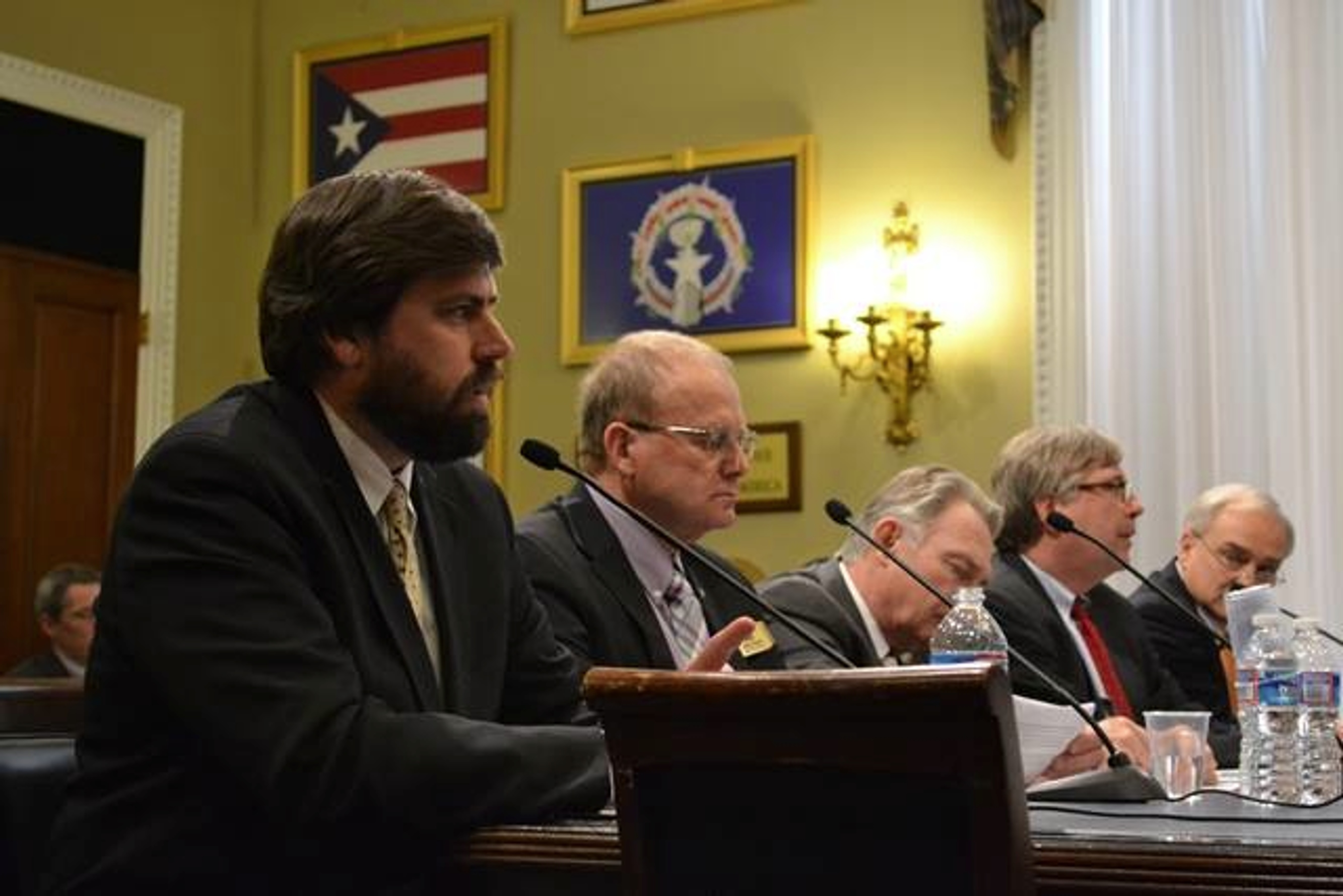National Agricultural Law Center Offers Assistance to Congress in Revising Fish and Wildlife Law

Harrison Pittman (left), director of the National Agricultural Law Center at the University of Arkansas System Division of Agriculture, testifies Feb. 27 in Washington before the House Fisheries, Wildlife and Insular Affairs Subcommittee.
WASHINGTON – A federal law on the books since 1900 regulating interstate game and fish shipments is causing concern among aquaculture producers and others who are worried about the heavy penalties – up to $250,000 for individuals – they could face for an inadvertent violation of the statute, a University of Arkansas System Division of Agriculture official told a congressional panel on Feb. 27.
Harrison Pittman, director of the National Agricultural Law Center, testified before the House Fisheries, Wildlife and Insular Affairs Subcommittee during its consideration of a bill introduced by Rep. Rick Crawford of Arkansas. The pending measure, the Aquaculture Risk Reduction Act (H.R. 3105), would amend the 114-year-old law known as Lacey Act so that it would no longer apply to animals accidentally included in shipments of aquatic species that are commercially produced for human consumption or recreational and ornamental purposes.
Pittman offered Congress the resources of the National Agricultural Law Center in its consideration of Crawford’s legislation and other issues regarding the Lacey Act. The law’s provisions apply to the aquaculture industry in Arkansas, which ranked third nationally in 2012 catfish production with 20 million pounds of the product valued at $17.4 million.
Pittman said aquaculture producers “have expressed concerns that it is often very difficult or impossible for them to know with confidence what the applicable laws are in a particular state, whether they are required to obtain a permit or other documentation in order to transport products from or into a state, and how that permit or other documentation can be obtained.”
Pittman explained that under the current law, criminal misdemeanor provisions apply to someone who “knowingly” engages in prohibited conduct and who should know “in the exercise of due care” that the applicable prohibited species were being transported or sold unlawfully. A civil violation penalty of up to $10,000 is also possible in some circumstances under that standard.
The “due care” standard is a subjective term, Pittman told the committee. “The level of due care applied in any given situation will typically depend on factors such as experience and knowledge,” he said. “For example, an experienced fish producer that violates a state’s fish or wildlife law may or may not be held to a higher degree of due care than a younger producer just starting in the industry, or a seasonal employee.”
As a result, Pittman said, the current Lacey Act “is applied differently to different categories of persons with varying degrees of knowledge and responsibility level.”
The Lacey Act’s felony provisions apply to anyone knowingly importing or exporting fish or wildlife in violation of the act and can result in a $250,000 fine for individuals or $500,000 for organizations. Pittman provided Congress material from an article by Elizabeth Rumley, senior staff attorney at the National Agricultural Law Center, explaining how the fine could be triggered.
“Imagine that a single fish, or even fish egg, legal to possess in one state, is inadvertently loaded with a 2,000-pound truckload of other fish sold to a producer in another state where that accidental fish or egg is illegal,” Rumley’s analysis said. “Once that shipment crosses the state line, both the buyer and seller can be prosecuted.” Had the shipper or buyer known the illegal nature of the errant fish or the value of the wildlife was more than $350, then they could be prosecuted under the law’s felony provisions – meaning up to five years in prison and/or a $250,000 fine.
Pittman listed other scenarios by which aquaculture producers could run into trouble with the law. When fingerlings of channel catfish, blue catfish or hybrids are delivered from nurseries to freshwater ponds, prohibited species could also be delivered to the ponds via eggs attached to a wild bird’s leg. The presence of the prohibited species could go undetected until the producer’s catfish are delivered to the processing plant.
“It shows how a producer could, through no fault of their own, have prohibited species in his or her ponds,” Pittman said. “It also demonstrates that it is possible to discover at the unloading phase at the processing facility any potential prohibited species that may have been contained in the shipment. Given the significant penalties associated with the Lacey Act, this factor has caused concern for producers and purchasers of farm-raised catfish.”
Topics
Contacts
David Edmark, Interim Coordinator
Agricultural Communication Services
479-575-6940,
dedmark@uark.edu
Headlines
PetSmart CEO J.K. Symancyk to Speak at Walton College Commencement
J.K. Symancyk is an alumnus of the Sam M. Walton College of Business and serves on the Dean’s Executive Advisory Board.
Faulkner Center, Arkansas PBS Partner to Screen Documentary 'Gospel'
The Faulkner Performing Arts Center will host a screening of Gospel, a documentary exploring the origin of Black spirituality through sermon and song, in partnership with Arkansas PBS at 7:30 p.m. Thursday, May 2.
UAPD Officers Mills and Edwards Honored With New Roles
Veterans of the U of A Police Department, Matt Mills has been promoted to assistant chief, and Crandall Edwards has been promoted to administrative captain.
Community Design Center's Greenway Urbanism Project Wins LIV Hospitality Design Award
"Greenway Urbanism" is one of six urban strategies proposed under the Framework Plan for Cherokee Village, a project that received funding through an Our Town grant from the National Endowment for the Arts.
Spring Bike Drive Refurbishes Old Bikes for New Students
All donated bikes will be given to Pedal It Forward, a local nonprofit that will refurbish your bike and return it to the U of A campus to be gifted to a student in need. Hundreds of students have already benefited.




